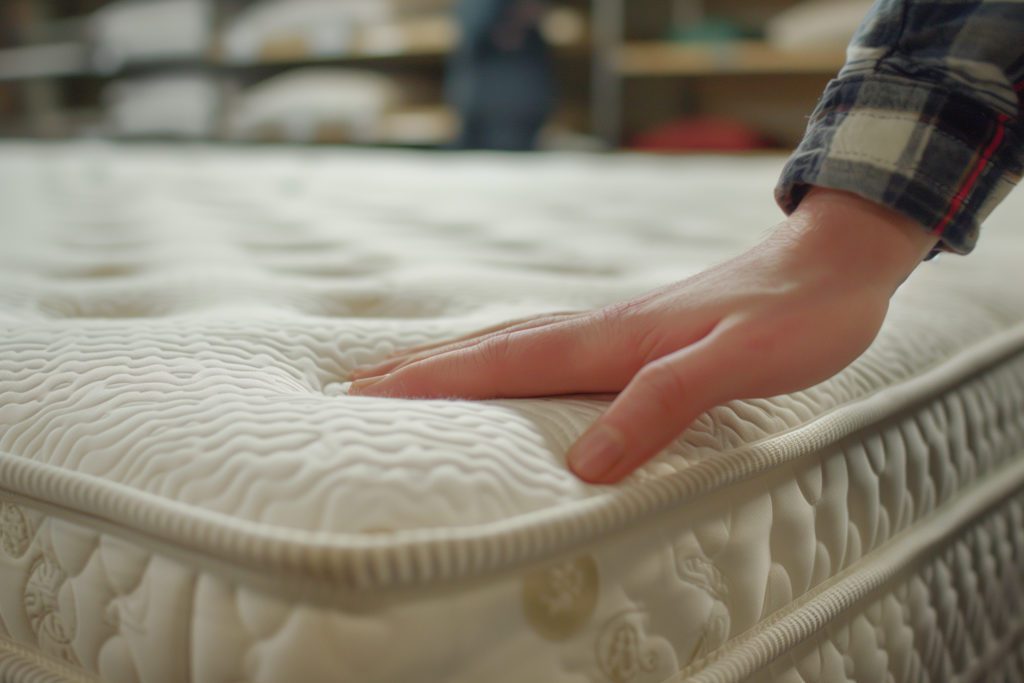
Waking Up Wrong: How to Prevent a Stiff Neck After Sleeping
Learn how to prevent a stiff neck after sleeping and what you can do to ease neck pain in the morning.

Waking up with a stiff neck is no way to start your day. When you attempt to turn your head to the side and are immediately overwhelmed with pain, you know that the rest of your day will be unpleasant.
A stiff neck in the morning often results from sleeping in a way that strains your muscles, and since you’re sleeping, you’re holding this position for hours. The result is stiffness and pain come morning.
Thankfully, there are many elements of our sleep that we can control to help reduce the risk of waking with a stiff neck. From the position you sleep in to the pillows you surround yourself with, you don’t have to go into the night unarmed against neck pain. And even more, we have tips that can help you ease any stiffness quickly, keeping the morning pain from edging into the rest of your day.
How To Prevent A Stiff Neck After Sleeping
Wake up with a stiff neck once, and you never want to again. We understand, so we’ve compiled the following tips to help prevent this jarringly painful way to start your day.
Position Yourself Strategically
If you want to reduce the likelihood of a stiff neck in the morning, opt for sleeping on your side or your back, as this keeps the neck in a neutral position. In comparison, sleeping on your stomach requires your head to be turned to the side all night, which can strain your neck muscles.
Pillow Up
Pillows cushion your head and keep your spine aligned correctly, so using the right number of supportive pillows can help your neck stay where it needs to as you sleep.
For back sleepers, the key is supporting both the head and neck. One way you can do this is by using a flatter pillow for your head and a neck roll or rounded pillow for under the neck. There are also special neck pillows, specific for back sleepers, that offer this support. Side sleepers should also use a pillow under their neck that is higher than the pillow under their head.
As for the type of pillow, feather pillows are good for both back and side sleepers, as they easily conform to the shape of your neck. They can compress over time, though, so be sure to replace them regularly. Memory form pillows are another option that contours to your head and neck.
The key for your pillow is to support your head and neck, but not too much. So, avoid high and stiff pillows as they’ll keep the neck flexed overnight, which can lead to stiffness in the morning.
Update an Old Mattress
The support for your entire body can also factor into the appearance of a stiff neck. If your mattress is old and sagging in the middle, consider replacing it. Ideally, a medium-firm mattress will offer the most support for your back and neck.
Watch Your Posture During the Day
While the position you put yourself in at night is important, having poor posture during the day can strain your neck in a way that only worsens at night. Instead, practice good posture during the day while sitting, standing, and walking. Computer workers, this one is for you, in particular—avoid bending your neck forward or hunching your shoulders as you work.
Your phone can be a culprit of neck pain, as well. When you’re on your phone, try to keep it at eye level so you don’t have to bend your neck to look at it. Additionally, when talking on the phone, avoid using your shoulder to hold it against your ear.
Stiff Neck? Here’s What Can Help
If you woke up with a stiff neck, here are some tips to ease the achiness and make it possible to look to the side without wincing in pain.
Ice It
If you wake up with a sore neck, reach for the ice pack and apply it to wherever it is sore for 20 minutes at a time. The cold helps to reduce inflammation in your neck muscles, which can help relieve pain.
A note: make sure that you aren’t applying the ice pack directly to your skin. Use a towel as a barrier to keep your skin from getting too cold.
Heat It
Has your pain lasted for more than a day? It’s time to add some heat. Grab a heat pack and apply it to the sore area for 20 minutes at a time to relax the muscles and ease tension.
Try OTC Painkillers
Over-the-counter (OTC) painkillers like acetaminophen (Tylenol), ibuprofen (Advil), and naproxen (Aleve) can help to reduce inflammation and ease the associated pain.
Keep Moving
When you wake up with a stiff neck, you might find yourself trying to keep as still as possible, but this can cause your muscles to tighten up, worsening the pain. Instead, gentle movement is your friend. Walking and yoga, in particular, can help increase blood flow to your neck and ease stiffness.
See a Doctor
If your neck pain has persisted for a couple of days and doesn’t appear to get better, even when implementing the above, consider seeing a doctor to get to the bottom of your pain.
Additionally, if the following symptoms ever accompany your neck pain, see a doctor; this pain likely isn’t just from the way you slept:
- Headache
- Fever
- A lump in your neck
- Shortness of breath
- Chest pain
- Difficulty swallowing
- Swollen glands
- Pain that spreads down your legs or arms
- Numbness or tingling in your limbs
Say Good Night to a Stiff Neck
Sleep is meant to rejuvenate you, not leave you with stiffness and pain as you start your day. However, sometimes you can wake up with just that, starting your day off on the wrong foot.
Luckily, there are techniques that can help you avoid a dreaded stiff neck in the morning, such as changing your sleeping position, using pillows, and watching your posture during the day. If a stiff neck still occurs, ice, heat, and over-the-counter painkillers should help you regain some of your mobility.
For more tips on navigating sleep-related problems, check out Pillow’s resource library for tips and tricks to improve your well-being.
FAQ
Can stress contribute to waking up with a stiff neck?
Yes, stress causes muscle tension, especially in the neck and shoulders, which can lead to stiffness after sleeping. When stressed, your body remains tense, making muscles more prone to discomfort. Relaxation techniques like deep breathing, meditation, or gentle stretching before bed can help reduce tension and prevent stiffness.
How does dehydration affect neck stiffness after sleeping?
Dehydration can lead to muscle cramps and stiffness, including in the neck. When the body lacks water, muscles lose elasticity and become more prone to discomfort. Since dehydration also reduces circulation and nutrient delivery, muscles may not recover properly overnight. Drinking enough fluids throughout the day can help keep muscles flexible and prevent tightness in the morning.
Can certain medications cause morning neck stiffness?
Yes, some medications, including statins for cholesterol, beta-blockers for blood pressure, and certain antidepressants, can cause muscle stiffness or cramping as side effects. These drugs may interfere with muscle function or hydration levels, leading to discomfort. If you think your medication is causing stiffness, consult your doctor about possible adjustments or alternative treatments.
How does age affect the likelihood of experiencing a stiff neck upon waking?
As we age, natural wear and tear on the spine, reduced muscle elasticity, and degenerative conditions like arthritis or cervical spondylosis increase the risk of waking up with a stiff neck. The spinal discs lose hydration over time, leading to stiffness. Regular stretching, strength exercises, good posture, and sleeping with a supportive pillow can help alleviate these age-related issues.
How does screen time before bed influence neck stiffness?
Using screens for long periods, especially with poor posture, puts strain on neck muscles, leading to stiffness. Constantly looking down at a phone or hunching over a computer can cause "tech neck," which results in muscle tightness. Reducing screen time before bed, maintaining proper posture, and stretching before sleep can help prevent morning neck discomfort.
Can certain sleep disorders contribute to waking up with a stiff neck?
Yes, sleep disorders like sleep apnea, restless leg syndrome, or insomnia can lead to frequent movements or poor sleep posture, causing muscle tension in the neck. People with sleep apnea may keep their head in awkward positions for extended periods. Treating underlying sleep issues, like using a CPAP machine or improving sleep hygiene, can help reduce morning stiffness.
Is it beneficial to perform neck stretches before bed to prevent morning stiffness?
Yes, stretching before bed helps relax tight muscles, improve flexibility, and prevent stiffness upon waking. Gentle movements such as slow neck rolls, side-to-side tilts, and shoulder shrugs can ease tension. Pairing stretching with deep breathing can further promote relaxation, ensuring that your neck muscles stay loose and comfortable throughout the night.

Written by
Jessica G.
Medical writer freelancer who has written hundreds of articles on varying topics. Masters of Engineering degree in Biomedical Engineering.
Download Pillow
Get help
Press & News
Legal
Connect
X (Twitter)
Company
Copyright © Neybox Digital Ltd.



